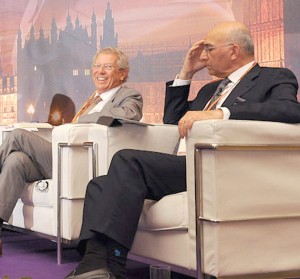London summit ends with panel, keynote speech
Legal scholars and world-renowned economists gathered in London as part of the inaugural USC Global Conversation on Monday and Tuesday.
The two-day event titled “The Future of the Global Economy” began Monday evening in London with an opening reception hosted by Elizabeth Garrett, provost and senior vice president for academic affairs.

Thinkers · Panelists Sir David King (left) and Hashem Pesaran, USC professor of economics, discuss the global financial crisis along with other panel members at a conference Tuesday. – Photo courtesy of USC News
Garrett highlighted USC’s commitment to recruiting students overseas. USC currently enrolls more international students than any other university in the United States, she said.
“Our scholarly community — faculty, students, alumni and supporters -— extends to every continent, and we rely on this community to represent our institutional values across the world,” Garrett said in a statement. “We believe that rigorous discussion of issues that are important to governments around the world help us form meaningful connections.”
Attendees included members of the USC Alumni Club of London and various deans from the university’s schools. Also in attendance was swimmer and Trojan Gold Medalist Rebecca Soni, who spoke following a panel discussion.
Tuesday’s events began with a keynote address from British Labour Party politician Jack Straw. Following the keynote presentation was a panel discussion moderated by Lord John Eatwell, who holds several academic posts at the University of Cambridge. The panel was made up of a combination of London-based experts on the global economy and USC faculty who are also experts on the same topic. The panelists included M. Hashem Pesaran, a USC economics professor; Sir David King, director of the Smith School of Enterprise and the Environment at the University of Oxford; Pip McCrostie, a vice chair at Ernst & Young; Manuel Castells, a USC professor in the Annenberg School for Communication and Journalism; and Straw.
Eatwell began the discussion by questioning the state of the global economy during a time of technological prosperity.
“Given all this remarkable technological change going on around us, why are we doing so badly? If things are so good, why are they so bad?” Eatwell asked the panelists.
In addition to the discussion of prosperity in certain fields and depression in others, Castells explained how the entire economy is interconnected.
“What this crisis has shown is that we are not simply a global economy, we are not simply an interdependent economy,” said Castells. “We are a network economy where everything is connected in real time through digital communication networks and therefore everything expands immediately.”
Another issue McCrostie highlighted was the lack of confidence in the financial industry.
“Probably one of the points we haven’t discussed this morning is the lack of confidence — the lack of global confidence — that the business community is feeling right now,” McCrostie said.
McCrostie said he sees growth in the global economy, though it is at low and stagnant levels.
“We’ve got to focus on what we can do to stimulate growth in a disciplined, measured way, learning the lessons of the last four years,” McCrostie said.
Pesaran also emphasized the imbalance between the financial market developments in the emerging world and the real development.
“There is no financial market in China,” Pesaran said. “The Chinese currency is not convertible. Indian currency is not convertible. There is no long-term bond market in China. There is no longterm bond market in India. You need to develop financial sectors in India and other imaginary markets.”
King, a former chief scientific adviser of the British government who currently holds posts at Oxford, Cambridge and other universities, focused the conversation on the underlying resource challenges posed by the financial crisis, citing oil production as an example.
“Oil production increased from 67 million barrels a day to 74 million barrels a day over the period from 1999 to 2005 and the price increased from $15 to $40 a barrel,” King said. “From 2005 to 2011, the price has been oscillating between $60 and $140 a barrel and that oscillation is a factor in this relatively poor attempt we’re having in regrowing our economy.”
King attributed the resource challenges to technological and behavioral inertia.
“We are damaging the global commons at an enormous rate,” King said. “Our economic system at the moment means that scarcity pushes up price and therefore we push things into nonexistence by that process.”
Eatwell ended the discussion on a more optimistic note, highlighting humankind’s ability to “bounce back” and the optimistic spirit of universities, such as USC.
“The program which USC has defined for itself, looking towards the future, points toward that fundamental optimism,” said Eatwell. “It’s an optimism that all universities fundamentally have in their DNA.”
